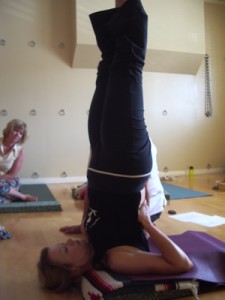A big question. I can’t pretend to even touch the surface of this huge topic in a simple and quick blog post. Likely I will write more about it in future. However, I do think I’d like to advance a few ideas.
Probably everyone with an interest in yoga has asked themselves what makes yoga effective, and recently, a variety of people from outside the traditional yoga circles, especially medical and psychological researchers, have been trying to discern the mechanisms involved. In the last few years there has been a big move toward evidence-based practice when it comes to health and wellness and that generally is a good thing in my opinion. But there are some drawbacks to trying to extract the potent pieces from a larger system and still have the same effects.
One of the strongest theories on how yoga works is that it increases vagal tone. Vagal tone basically is a fancy word for the part of the nervous system that is involved in the relaxation response or its parasympathetic branch, measurable by markers such as heart rate variability. When vagal tone is high, digestion improves, hearts function optimally, and moods stabilize. Studies with specific populations such as people who suffer with post-traumatic stress disorder, depression and epilepsy have provided support for the theory that yoga has a beneficial effect on vagal tone. See this link if you are interested: http://www.medical-hypotheses.com/article/S0306-9877%2812%2900032-1/abstract. But significant questions remain – for instance, in the studies, what practices (specific postures, breath work, chant, etc.) were included in the yoga, did respondents have to practice regularly, what bearing did the healing relationship amongst teacher and the students have on the results? And if the relationships in a yoga class accounted for a sizeable part of the benefit, does that mean we should give up yoga classes and just hang around in pubs with other people? Add to that the sizeable problem that improved vagal tone cannot be the only main benefit of yoga because it does not fully explain improved bone mass, balance, and attention, amongst other things.
 Some yoga poses known to evoke the relaxation response are not accessible to all students. Take shoulderstand, for instance. Shoulderstand is known in yoga circles as “full-body pose” or Sarvangasana in Sanskrit and also is often called the “mother” or “queen” of asana. B.K.S. Iyengar, the late yoga master known best for his meticulous attention to alignment and use of props, wrote in Light on Yoga, “The importance of Sarvangasana cannot be over-emphasized. It is one of the greatest boons conferred on humanity by our ancient sages. . . . It is a panacea for most common ailments . . . glands . . . blood flow . . . body gravity . . . soothing effect of the pose on the nerves,” and so on. I think I would add that the attention to detail, cultivating the courage to invert, perseverance to perfect a position, challenge to knowing where the body is in space also count as mechanisms or benefits to working with a pose like shoulderstand.
Some yoga poses known to evoke the relaxation response are not accessible to all students. Take shoulderstand, for instance. Shoulderstand is known in yoga circles as “full-body pose” or Sarvangasana in Sanskrit and also is often called the “mother” or “queen” of asana. B.K.S. Iyengar, the late yoga master known best for his meticulous attention to alignment and use of props, wrote in Light on Yoga, “The importance of Sarvangasana cannot be over-emphasized. It is one of the greatest boons conferred on humanity by our ancient sages. . . . It is a panacea for most common ailments . . . glands . . . blood flow . . . body gravity . . . soothing effect of the pose on the nerves,” and so on. I think I would add that the attention to detail, cultivating the courage to invert, perseverance to perfect a position, challenge to knowing where the body is in space also count as mechanisms or benefits to working with a pose like shoulderstand.
Lately, though, shoulderstand has come under much scrutiny for the potential danger it can pose to the cervical spine and associated structures in susceptible individuals. Some would say we should just not bother practicing it. I tend to argue that while we should not blindly practice some rigid version of the pose in a ritualistic fashion as is the case in some schools of yoga, we also should not just abandon it without considering what we might be sacrificing in the process. There are a variety of ways it can be practiced and obtain most of the benefits. But we can lose some of the advantages, too. If we decide to practice a variation on shoulderstand, we should know how we will replace the effects displaced by the change with some other yogic practice.
Last week in a retreat I attended, I heard a complementary health provider and occasional practitioner of yoga state that, in the interest of safety, if yoga teachers wanted to stimulate the parasympathetic nervous system (Iyengar’s soothing effect of the pose on the nerves and probably the vagal tone stimulation about which I was writing at the beginning of this post), we should avoid questionable or controversial yoga poses such as shoulderstand and simply have our students lay on their backs with an eye pillow over their closed eyelids. I had to work hard at not being insulted or appearing incredulous. Like an eye pillow would be enough, if mobilizing the relaxation response could be that simple! We know that inability to relax is one of the biggest scourges of human life. For a significant proportion of the general population, laying still with no distractions is nigh impossible (perhaps more impossible than doing shoulderstand!). And to add to the difficulty of such a flippant “solution”, another retreatant with a professional understanding of disorders of the eye cautioned against having much of the weight of an eye pillow on the eyeballs. Her reasoning might be different, but this article sheds some light on some of the issues with using an eyebag: https://www.science.unsw.edu.au/news/watch-how-you-rub-warning-eye-spikes.
Reductionism such as implying that a simple remedy taken from the mainstream could substitute for a “problematic” yoga pose or even yoga practice generally seems to be a simplistic attempt at avoiding the real issue at hand – that we do not fully know how yoga gets the results. As a dear teacher I know says, “It’s not that simple!” The larger practice of yoga includes a whole set of attitudes and philosophies such as those described in Patanjali’s Yoga Sutras. We are called to practice with zeal (tapas, abhaysa) and detachment (vairagya) while also avoiding harmful (ahimsa), ego-building (asmita) activity in order to build desirable qualities such as discernment or discrimination (viveka).
Personally, I have found that the real benefits of yoga come when I faithfully, compassionately and mindfully return to my yoga mat day after day with curiousity about what I will find out, relinquishing any need to experience specific results. Perhaps this type of mechanism cannot be quantified.


 I’ve been practicing yoga, sometimes more fervently than others, for 35 years, and teaching it for over fifteen of those years. In 2008, I came to the realization that my true passion lay in using yoga therapeutically, that is to apply the teachings and practices of yoga when working with individual clients to empower them to progress toward improved health and well-being. I investigated various ways to learn more and develop competency. I embarked on two different and fairly major complementary trainings and by 2010, both were complete. Nevertheless, I find myself continuously seeking out more knowledge and opportunities to practice and I rather doubt that my lifelong learning will cease soon, if ever.
I’ve been practicing yoga, sometimes more fervently than others, for 35 years, and teaching it for over fifteen of those years. In 2008, I came to the realization that my true passion lay in using yoga therapeutically, that is to apply the teachings and practices of yoga when working with individual clients to empower them to progress toward improved health and well-being. I investigated various ways to learn more and develop competency. I embarked on two different and fairly major complementary trainings and by 2010, both were complete. Nevertheless, I find myself continuously seeking out more knowledge and opportunities to practice and I rather doubt that my lifelong learning will cease soon, if ever. “yoga therapists” out there falls more in the “chance” and “general” categories.
“yoga therapists” out there falls more in the “chance” and “general” categories. ss’ offerings are specifically customized to the individuals within it. In other words, it is the individual who is receiving the yoga therapy, not the disease condition being treated.
ss’ offerings are specifically customized to the individuals within it. In other words, it is the individual who is receiving the yoga therapy, not the disease condition being treated. atanjali) which include the educational teachings of yama and niyama (guidelines for living with self and others), asana (intelligently applied postures), pranayama (control of energy using breath), pratyahara (withdrawal of the consciousness from external senses), dharana, dhyana, and samadhi (three stages of concentration). Also included are the application of meditation, textual study, spiritual or psychological counseling, chanting, imagery, prayer, and ritual to meet the needs of the individual. The whol
atanjali) which include the educational teachings of yama and niyama (guidelines for living with self and others), asana (intelligently applied postures), pranayama (control of energy using breath), pratyahara (withdrawal of the consciousness from external senses), dharana, dhyana, and samadhi (three stages of concentration). Also included are the application of meditation, textual study, spiritual or psychological counseling, chanting, imagery, prayer, and ritual to meet the needs of the individual. The whol e field of ayurvedic (Traditional Indian) medicine also informs yoga therapy.
e field of ayurvedic (Traditional Indian) medicine also informs yoga therapy. addressing equally the complex needs of highly-driven athletes and bedridden invalids, happy people and sad people, the disenfranchised, destitute and compromised as well as the privileged and rich. Some yoga therapists specialize more with a certain population or type of issue. However, overall, it is part of yoga therapist’s skill set to determine how best to work with individuals to unearth the ways in which they are suffering, explore how their constitution and life circumstances are involved, and together develop and enact a yoga-based plan for moving forward i
addressing equally the complex needs of highly-driven athletes and bedridden invalids, happy people and sad people, the disenfranchised, destitute and compromised as well as the privileged and rich. Some yoga therapists specialize more with a certain population or type of issue. However, overall, it is part of yoga therapist’s skill set to determine how best to work with individuals to unearth the ways in which they are suffering, explore how their constitution and life circumstances are involved, and together develop and enact a yoga-based plan for moving forward i n a way that will help them to GROW through life joyfully.
n a way that will help them to GROW through life joyfully.